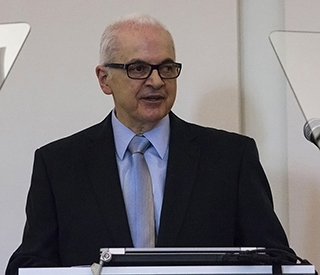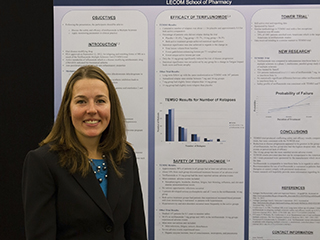John M. Ferretti, D.O., F.A.C.O.I., President and CEO of the Lake Erie College of Osteopathic Medicine (LECOM), told members of the Pennsylvania Society of Health-System Pharmacists (PSHP) that the landmark Affordable Care Act will create both challenges and opportunities for the pharmacy profession.
 |
| Dr. Ferretti said that pharmacists will have a crucial role in healthcare delivery as a result of the Affordable Care Act and a growing elderly population that relies heavily on medications to help manage chronic diseases. |
During his keynote address at the PSHP’s 45th Annual Assembly, Dr. Ferretti noted that the Affordable Care Act, along with an aging population and other factors, will have a direct and significant impact on pharmacists. “The greatest growth in our elderly population is among those aged 85 and older, clearly a population with an increasing chronic disease burden and one with a need for complex medication management,” Dr. Ferretti said.
With the landscape of healthcare changing dramatically, Dr. Ferretti said pharmacists and physicians will have to work collaboratively to both improve patient outcomes and limit costs as much as possible. He also echoed the sentiments of others within the profession of pharmacy: pharmacists, in spite of their training, are often the most underutilized healthcare professionals.
Greater collaboration between pharmacists and physicians within patient-centered medical homes can save thousands of lives, reduce hospital admissions and save tens of billions of dollars in direct and indirect costs. “Pharmacists have been involved in direct patient care for decades and are uniquely trained to identify and resolve drug related problems,” he said. “Through the evaluation of appropriate efficacy, safety, and adherence, medication use can be optimized and unnecessary health care spending can be avoided. These concepts are best utilized in collaboration with physicians and with other health care providers.”
In conclusion, Dr. Ferretti said that despite the challenges that lie ahead, this is an exciting time for the pharmacy profession. “To succeed, pharmacy as a profession must hold true to its vision and avoid fragmentation to unite around a common vision for the nation,” he noted. “The Pennsylvania Society of Health-System Pharmacists can take a leadership role by helping to unite the entire profession around health outcomes important to the citizens of the Commonwealth. There is no doubt that successes can be created and that the vision of a strong future awaits a thriving pharmacy profession.”
This year’s PSHP Assembly was held in Erie for the first time. Gerald E. Meyer, Pharm.D., MBA, FASHP, President of the American Society of Health-System Pharmacists, gave the Assembly’s other keynote address.
 |
| Amy Newell, P3, was one of the students from the LECOM School of Pharmacy to give a poster presentation during the PSHP’s Annual Assembly. |
The three-day event also included a number of lectures, roundtable discussions and poster presentations. A number of students and faculty members from the LECOM School of Pharmacy participated.
More about the Pennsylvania Society of Health-System Pharmacists
Established in 1970, the Pennsylvania Society of Health-System Pharmacists (PSHP) is one of the largest state affiliates of the American Society of Health-System Pharmacists. The organization’s members include pharmacists, pharmacy technicians, students of pharmacy and representatives of the pharmaceutical industry, who also serve in ambulatory care facilities, health maintenance organizations, psychiatric facilities, sub-acute and chronic care facilities and correctional facilities. PSHP seeks to advance and support the professional practice of health-system pharmacy and to serve as its collective voice through education, networking and advocacy.

